Entrepreneurship Report: Venture Analysis, Traits, and Economic Impact
VerifiedAdded on 2020/06/06
|16
|4996
|47
Report
AI Summary
This report delves into the multifaceted world of entrepreneurship and small business management. It begins by defining entrepreneurship and exploring different types of entrepreneurial ventures, including start-ups, new developments, joint ventures, and partnerships, as well as the typology of entrepreneurship, examining the life cycle of entrepreneurial firms. The report then differentiates between various entrepreneurial ventures, such as lifestyle ventures, smaller profit ventures, and high-growth ventures, highlighting their similarities and differences. It also touches on intrapreneurship and social entrepreneurship. Furthermore, the report examines the impact of micro and small businesses on the economy, the importance of small businesses and start-ups to the growth of the social economy, the characteristic traits and skills of successful entrepreneurs, the role of personality as a motivational tool, and the background and experiences that can either hinder or foster entrepreneurship. The report provides a comprehensive overview of key concepts, offering valuable insights into the entrepreneurial landscape.

Entrepreneurship and
Small Business
Management
Small Business
Management
Paraphrase This Document
Need a fresh take? Get an instant paraphrase of this document with our AI Paraphraser
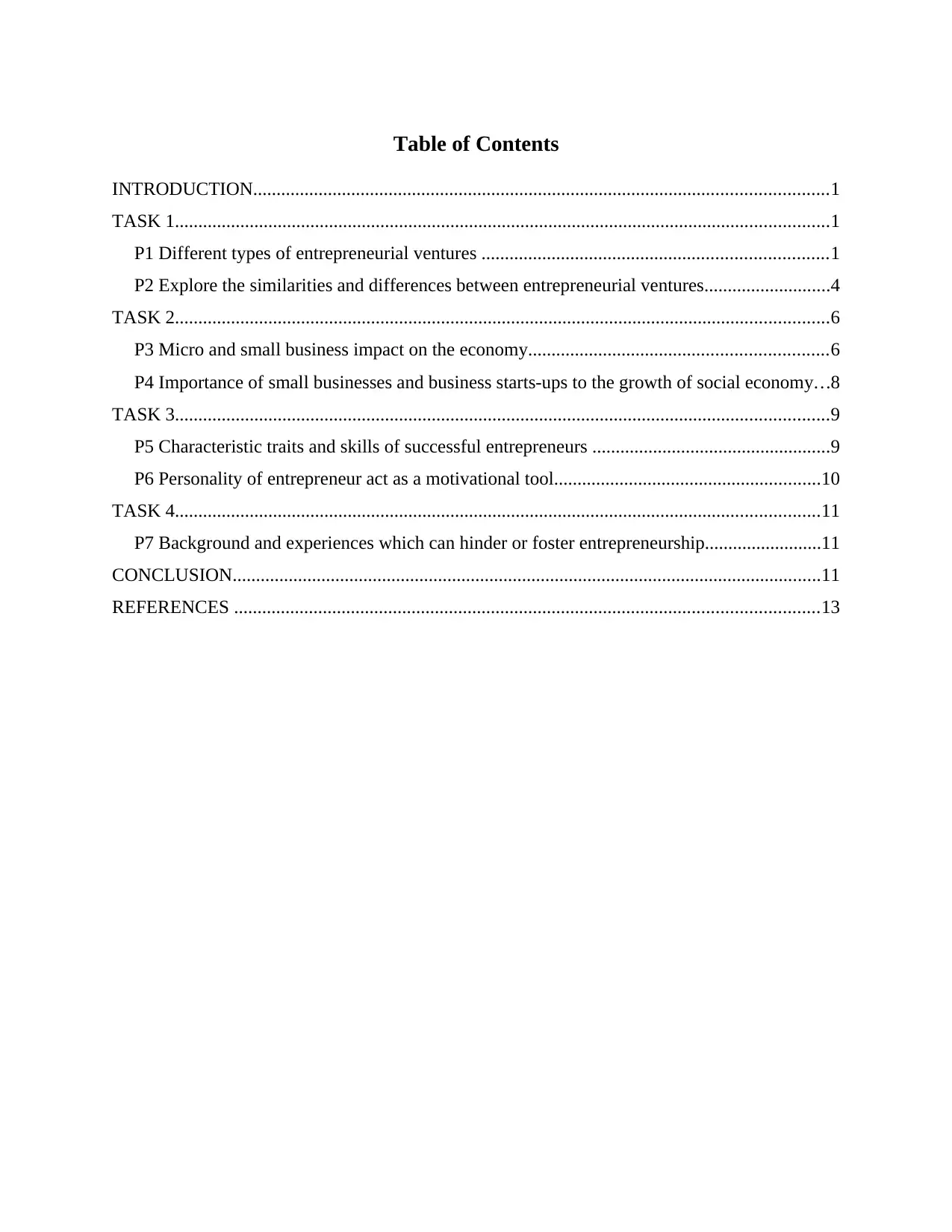
Table of Contents
INTRODUCTION...........................................................................................................................1
TASK 1............................................................................................................................................1
P1 Different types of entrepreneurial ventures ..........................................................................1
P2 Explore the similarities and differences between entrepreneurial ventures...........................4
TASK 2............................................................................................................................................6
P3 Micro and small business impact on the economy................................................................6
P4 Importance of small businesses and business starts-ups to the growth of social economy...8
TASK 3............................................................................................................................................9
P5 Characteristic traits and skills of successful entrepreneurs ...................................................9
P6 Personality of entrepreneur act as a motivational tool.........................................................10
TASK 4..........................................................................................................................................11
P7 Background and experiences which can hinder or foster entrepreneurship.........................11
CONCLUSION..............................................................................................................................11
REFERENCES .............................................................................................................................13
INTRODUCTION...........................................................................................................................1
TASK 1............................................................................................................................................1
P1 Different types of entrepreneurial ventures ..........................................................................1
P2 Explore the similarities and differences between entrepreneurial ventures...........................4
TASK 2............................................................................................................................................6
P3 Micro and small business impact on the economy................................................................6
P4 Importance of small businesses and business starts-ups to the growth of social economy...8
TASK 3............................................................................................................................................9
P5 Characteristic traits and skills of successful entrepreneurs ...................................................9
P6 Personality of entrepreneur act as a motivational tool.........................................................10
TASK 4..........................................................................................................................................11
P7 Background and experiences which can hinder or foster entrepreneurship.........................11
CONCLUSION..............................................................................................................................11
REFERENCES .............................................................................................................................13
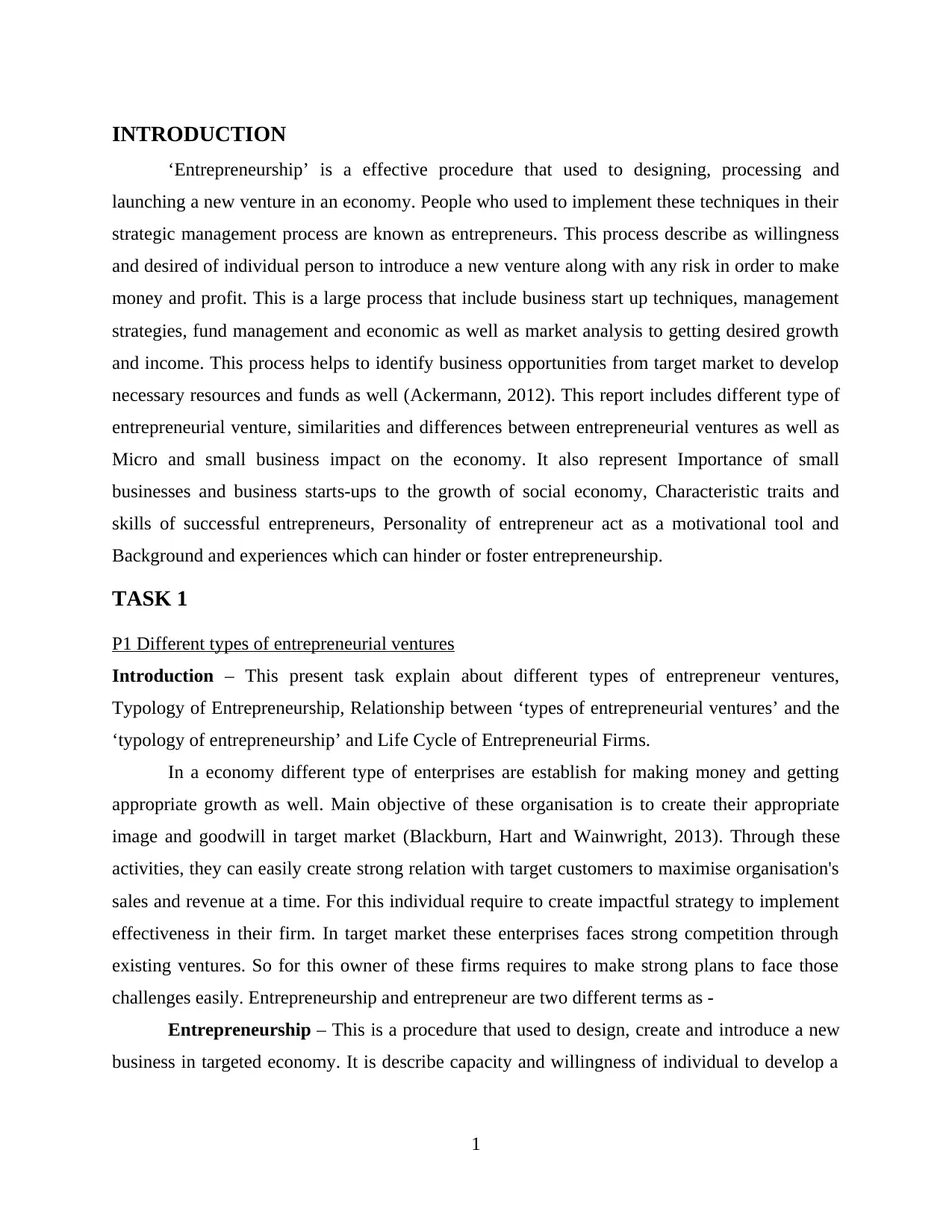
INTRODUCTION
‘Entrepreneurship’ is a effective procedure that used to designing, processing and
launching a new venture in an economy. People who used to implement these techniques in their
strategic management process are known as entrepreneurs. This process describe as willingness
and desired of individual person to introduce a new venture along with any risk in order to make
money and profit. This is a large process that include business start up techniques, management
strategies, fund management and economic as well as market analysis to getting desired growth
and income. This process helps to identify business opportunities from target market to develop
necessary resources and funds as well (Ackermann, 2012). This report includes different type of
entrepreneurial venture, similarities and differences between entrepreneurial ventures as well as
Micro and small business impact on the economy. It also represent Importance of small
businesses and business starts-ups to the growth of social economy, Characteristic traits and
skills of successful entrepreneurs, Personality of entrepreneur act as a motivational tool and
Background and experiences which can hinder or foster entrepreneurship.
TASK 1
P1 Different types of entrepreneurial ventures
Introduction – This present task explain about different types of entrepreneur ventures,
Typology of Entrepreneurship, Relationship between ‘types of entrepreneurial ventures’ and the
‘typology of entrepreneurship’ and Life Cycle of Entrepreneurial Firms.
In a economy different type of enterprises are establish for making money and getting
appropriate growth as well. Main objective of these organisation is to create their appropriate
image and goodwill in target market (Blackburn, Hart and Wainwright, 2013). Through these
activities, they can easily create strong relation with target customers to maximise organisation's
sales and revenue at a time. For this individual require to create impactful strategy to implement
effectiveness in their firm. In target market these enterprises faces strong competition through
existing ventures. So for this owner of these firms requires to make strong plans to face those
challenges easily. Entrepreneurship and entrepreneur are two different terms as -
Entrepreneurship – This is a procedure that used to design, create and introduce a new
business in targeted economy. It is describe capacity and willingness of individual to develop a
1
‘Entrepreneurship’ is a effective procedure that used to designing, processing and
launching a new venture in an economy. People who used to implement these techniques in their
strategic management process are known as entrepreneurs. This process describe as willingness
and desired of individual person to introduce a new venture along with any risk in order to make
money and profit. This is a large process that include business start up techniques, management
strategies, fund management and economic as well as market analysis to getting desired growth
and income. This process helps to identify business opportunities from target market to develop
necessary resources and funds as well (Ackermann, 2012). This report includes different type of
entrepreneurial venture, similarities and differences between entrepreneurial ventures as well as
Micro and small business impact on the economy. It also represent Importance of small
businesses and business starts-ups to the growth of social economy, Characteristic traits and
skills of successful entrepreneurs, Personality of entrepreneur act as a motivational tool and
Background and experiences which can hinder or foster entrepreneurship.
TASK 1
P1 Different types of entrepreneurial ventures
Introduction – This present task explain about different types of entrepreneur ventures,
Typology of Entrepreneurship, Relationship between ‘types of entrepreneurial ventures’ and the
‘typology of entrepreneurship’ and Life Cycle of Entrepreneurial Firms.
In a economy different type of enterprises are establish for making money and getting
appropriate growth as well. Main objective of these organisation is to create their appropriate
image and goodwill in target market (Blackburn, Hart and Wainwright, 2013). Through these
activities, they can easily create strong relation with target customers to maximise organisation's
sales and revenue at a time. For this individual require to create impactful strategy to implement
effectiveness in their firm. In target market these enterprises faces strong competition through
existing ventures. So for this owner of these firms requires to make strong plans to face those
challenges easily. Entrepreneurship and entrepreneur are two different terms as -
Entrepreneurship – This is a procedure that used to design, create and introduce a new
business in targeted economy. It is describe capacity and willingness of individual to develop a
1
⊘ This is a preview!⊘
Do you want full access?
Subscribe today to unlock all pages.

Trusted by 1+ million students worldwide

venture along with any kind of risk in order to getting desired growth and income as well. In
simple words, this term is used to starting a new business in effective manner.
Entrepreneur – These are the individuals who create impactful strategy to establish a
new venture in target economy. They take risk in order to getting desired competitive advantages
as well as make a profit. In this procedure they implement innovative ideas and advance
technology to maximise their organisation and its service values.
Typology of Entrepreneurship -
Individual Entrepreneurship – These type of Entrepreneurship are carried out by a
individual person who have specific right to make any changes in them. They has
authority of ownership and also a right or license to use it and disposal of property. For
them it is requires to use all resources properly and allocate appropriate funds for firm.
Moreover to mange resources it is required to utilize them effectively and properly.
Corporate Entrepreneurship – This is a traditional form of entrepreneurship in which all
the organisation wants to get effective growth and success in target market to achieve
higher competitive advantages easily. For this firm requires to create appropriate
framework that used to support innovation and creative ideas. This process basically used
to develop new venture, process and strategies inside of an existing organisation to
maximise its values, growth and revenues as well (Bridge and O'Neill, 2012).
Public Sector Entrepreneurship – These type of entrepreneurship are basically used to
make effective modification in public initiatives and policy which is carried out by
different groups or individual. For this entrepreneur requires to use conductive and
strategic process to engaging in such activities to face uncertainty. In these initiatives,
public sector Entrepreneurship requires to use advance technology and innovative ideas
to make impactful modifications.
Types of Entrepreneurial Ventures
Start-up – This term is basically uses for a new development in economy that can be a
beginning of company. These are the new ventures and companies that implement new
and innovative ideas to enter into the market. High risk are associated with their activities
but large number of opportunities are available for capturing target market (Bruton,
Ahlstrom and Li, 2010).
2
simple words, this term is used to starting a new business in effective manner.
Entrepreneur – These are the individuals who create impactful strategy to establish a
new venture in target economy. They take risk in order to getting desired competitive advantages
as well as make a profit. In this procedure they implement innovative ideas and advance
technology to maximise their organisation and its service values.
Typology of Entrepreneurship -
Individual Entrepreneurship – These type of Entrepreneurship are carried out by a
individual person who have specific right to make any changes in them. They has
authority of ownership and also a right or license to use it and disposal of property. For
them it is requires to use all resources properly and allocate appropriate funds for firm.
Moreover to mange resources it is required to utilize them effectively and properly.
Corporate Entrepreneurship – This is a traditional form of entrepreneurship in which all
the organisation wants to get effective growth and success in target market to achieve
higher competitive advantages easily. For this firm requires to create appropriate
framework that used to support innovation and creative ideas. This process basically used
to develop new venture, process and strategies inside of an existing organisation to
maximise its values, growth and revenues as well (Bridge and O'Neill, 2012).
Public Sector Entrepreneurship – These type of entrepreneurship are basically used to
make effective modification in public initiatives and policy which is carried out by
different groups or individual. For this entrepreneur requires to use conductive and
strategic process to engaging in such activities to face uncertainty. In these initiatives,
public sector Entrepreneurship requires to use advance technology and innovative ideas
to make impactful modifications.
Types of Entrepreneurial Ventures
Start-up – This term is basically uses for a new development in economy that can be a
beginning of company. These are the new ventures and companies that implement new
and innovative ideas to enter into the market. High risk are associated with their activities
but large number of opportunities are available for capturing target market (Bruton,
Ahlstrom and Li, 2010).
2
Paraphrase This Document
Need a fresh take? Get an instant paraphrase of this document with our AI Paraphraser
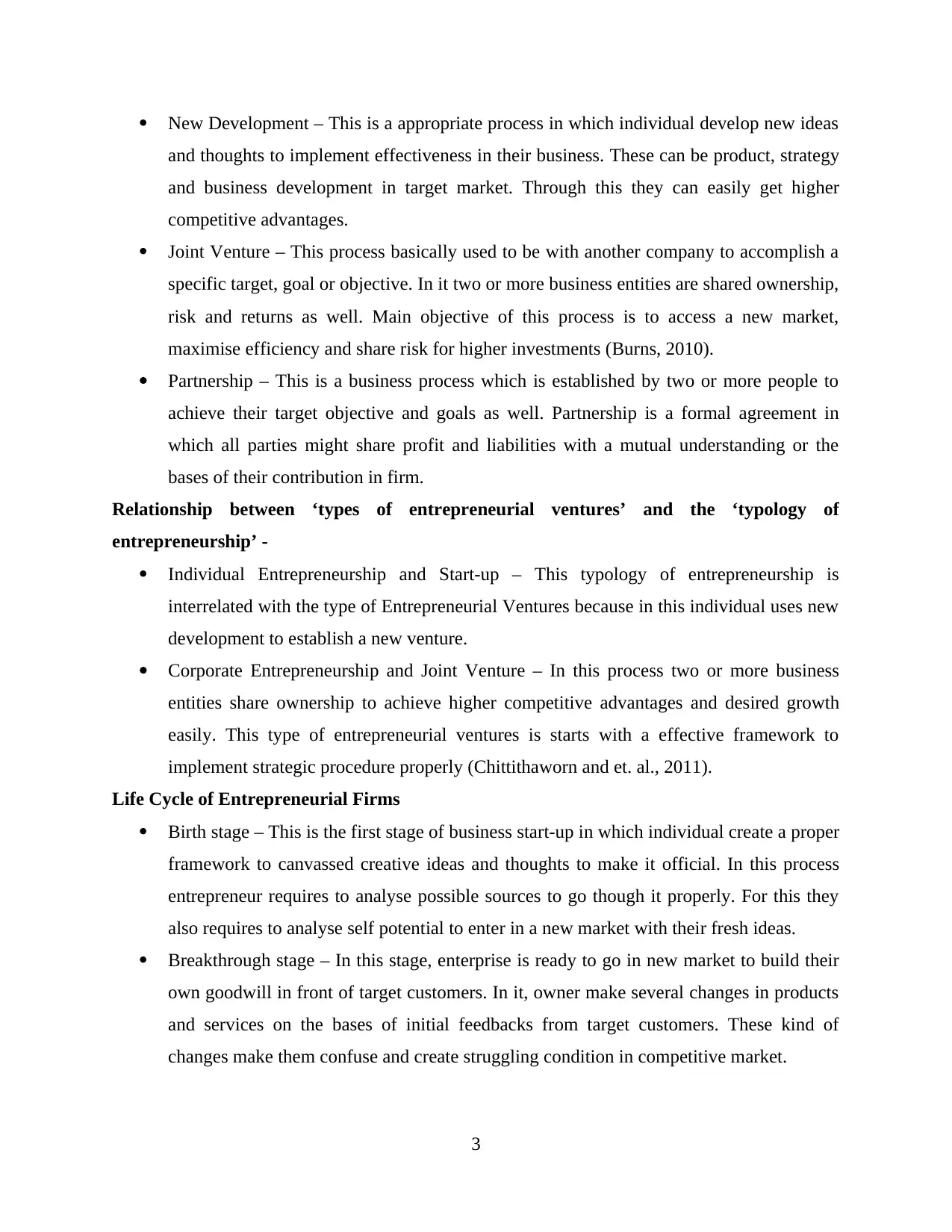
New Development – This is a appropriate process in which individual develop new ideas
and thoughts to implement effectiveness in their business. These can be product, strategy
and business development in target market. Through this they can easily get higher
competitive advantages.
Joint Venture – This process basically used to be with another company to accomplish a
specific target, goal or objective. In it two or more business entities are shared ownership,
risk and returns as well. Main objective of this process is to access a new market,
maximise efficiency and share risk for higher investments (Burns, 2010).
Partnership – This is a business process which is established by two or more people to
achieve their target objective and goals as well. Partnership is a formal agreement in
which all parties might share profit and liabilities with a mutual understanding or the
bases of their contribution in firm.
Relationship between ‘types of entrepreneurial ventures’ and the ‘typology of
entrepreneurship’ -
Individual Entrepreneurship and Start-up – This typology of entrepreneurship is
interrelated with the type of Entrepreneurial Ventures because in this individual uses new
development to establish a new venture.
Corporate Entrepreneurship and Joint Venture – In this process two or more business
entities share ownership to achieve higher competitive advantages and desired growth
easily. This type of entrepreneurial ventures is starts with a effective framework to
implement strategic procedure properly (Chittithaworn and et. al., 2011).
Life Cycle of Entrepreneurial Firms
Birth stage – This is the first stage of business start-up in which individual create a proper
framework to canvassed creative ideas and thoughts to make it official. In this process
entrepreneur requires to analyse possible sources to go though it properly. For this they
also requires to analyse self potential to enter in a new market with their fresh ideas.
Breakthrough stage – In this stage, enterprise is ready to go in new market to build their
own goodwill in front of target customers. In it, owner make several changes in products
and services on the bases of initial feedbacks from target customers. These kind of
changes make them confuse and create struggling condition in competitive market.
3
and thoughts to implement effectiveness in their business. These can be product, strategy
and business development in target market. Through this they can easily get higher
competitive advantages.
Joint Venture – This process basically used to be with another company to accomplish a
specific target, goal or objective. In it two or more business entities are shared ownership,
risk and returns as well. Main objective of this process is to access a new market,
maximise efficiency and share risk for higher investments (Burns, 2010).
Partnership – This is a business process which is established by two or more people to
achieve their target objective and goals as well. Partnership is a formal agreement in
which all parties might share profit and liabilities with a mutual understanding or the
bases of their contribution in firm.
Relationship between ‘types of entrepreneurial ventures’ and the ‘typology of
entrepreneurship’ -
Individual Entrepreneurship and Start-up – This typology of entrepreneurship is
interrelated with the type of Entrepreneurial Ventures because in this individual uses new
development to establish a new venture.
Corporate Entrepreneurship and Joint Venture – In this process two or more business
entities share ownership to achieve higher competitive advantages and desired growth
easily. This type of entrepreneurial ventures is starts with a effective framework to
implement strategic procedure properly (Chittithaworn and et. al., 2011).
Life Cycle of Entrepreneurial Firms
Birth stage – This is the first stage of business start-up in which individual create a proper
framework to canvassed creative ideas and thoughts to make it official. In this process
entrepreneur requires to analyse possible sources to go though it properly. For this they
also requires to analyse self potential to enter in a new market with their fresh ideas.
Breakthrough stage – In this stage, enterprise is ready to go in new market to build their
own goodwill in front of target customers. In it, owner make several changes in products
and services on the bases of initial feedbacks from target customers. These kind of
changes make them confuse and create struggling condition in competitive market.
3

Maturity stage – This is proper maturity stage in which entrepreneur understand all the
marketing functions and other struggle that helps to provide them higher growth and
profits as well.
Conclusion – In this above task it has been determine that definition of Entrepreneurship and
Entrepreneur, typologies of Entrepreneurship and Types of Entrepreneurial Ventures. After this
it has been represent interrelation between these two terms as typologies of Entrepreneurship
and Types of Entrepreneurial Ventures. At last it is represent Life Cycle of Entrepreneurial
Firms.
P2 Explore the similarities and differences between entrepreneurial ventures
Introduction – This task is going to discuss about difference and similarity between
entrepreneurial ventures and definition of Intrapreneurship as well as Social Entrepreneurship.
In a economy different type of business organisations are establish with different
objectives and goals as well. They find different type of business opportunities from the target
market on the bases of their strategy and business approaches (Cowling, Liu and Ledger, 2012).
There are appropriate differences between several entrepreneurial ventures are given below as -
Differences between the entrepreneurial ventures
Lifestyle Venture – These type of business ventures are set up by individual with the
aim of enjoy particular lifestyle. They are known as creative mind who implement their
strategies in business process appropriately. These kind of venture provide higher satisfaction to
their owner as well as customers at the same level.
Smaller Profit Venture – These are privately owned organisations that have limited
number of employees and resources. This type of organisations are earn minor annual revenue in
the comparison of high growth organisation. These kind of organisations take higher risk to
create their own marketing image in competitive market. For them entrepreneur requires to make
impactful strategy to build strong relation with target customers (Dennis Jr, 2011).
High Growth Venture – Some of the business organisations are establish to design their
own purpose that helps to achieve high growth. These kind of business owners create appropriate
objectives and strategies to getting rapid growth easily. For this they uses different kind of
marketing procedure such as different promotional tools, advertisement process, door to door
marketing and develop a effective pool with investors to getting appropriate capital organisation.
4
marketing functions and other struggle that helps to provide them higher growth and
profits as well.
Conclusion – In this above task it has been determine that definition of Entrepreneurship and
Entrepreneur, typologies of Entrepreneurship and Types of Entrepreneurial Ventures. After this
it has been represent interrelation between these two terms as typologies of Entrepreneurship
and Types of Entrepreneurial Ventures. At last it is represent Life Cycle of Entrepreneurial
Firms.
P2 Explore the similarities and differences between entrepreneurial ventures
Introduction – This task is going to discuss about difference and similarity between
entrepreneurial ventures and definition of Intrapreneurship as well as Social Entrepreneurship.
In a economy different type of business organisations are establish with different
objectives and goals as well. They find different type of business opportunities from the target
market on the bases of their strategy and business approaches (Cowling, Liu and Ledger, 2012).
There are appropriate differences between several entrepreneurial ventures are given below as -
Differences between the entrepreneurial ventures
Lifestyle Venture – These type of business ventures are set up by individual with the
aim of enjoy particular lifestyle. They are known as creative mind who implement their
strategies in business process appropriately. These kind of venture provide higher satisfaction to
their owner as well as customers at the same level.
Smaller Profit Venture – These are privately owned organisations that have limited
number of employees and resources. This type of organisations are earn minor annual revenue in
the comparison of high growth organisation. These kind of organisations take higher risk to
create their own marketing image in competitive market. For them entrepreneur requires to make
impactful strategy to build strong relation with target customers (Dennis Jr, 2011).
High Growth Venture – Some of the business organisations are establish to design their
own purpose that helps to achieve high growth. These kind of business owners create appropriate
objectives and strategies to getting rapid growth easily. For this they uses different kind of
marketing procedure such as different promotional tools, advertisement process, door to door
marketing and develop a effective pool with investors to getting appropriate capital organisation.
4
⊘ This is a preview!⊘
Do you want full access?
Subscribe today to unlock all pages.

Trusted by 1+ million students worldwide

These kind of business venture are very different to Lifestyle and Smaller Profit business
organisations.
Similarities of entrepreneurial ventures
New ideas – All the business organisations are establish in the economy through new
and creative ideas. This procedure mostly uses by Smaller Profit and High Growth Ventures.
Through this they are easily implement new and effective alteration in their business procedure
and products. New ideas can be beneficial fir those organisation who wants to provide effective
and creative services to their customers properly. For this entrepreneur requires to use innovative
ideas and strategic process to getting desired business advantages easily (Down, 2010).
Being risky – All the entrepreneur develop their business organisations along with any
kind of risk in order to getting desired growth and income easily. These type of activities helps to
provide different opportunities to business organisations. Mostly Smaller Profit and High Growth
Venture takes any kind of risk to build their own marketing image easily. Main motive behind
this process is to getting effective profit and rapid growth in target market on the bass of their
products and services as well.
Established by open-minded entrepreneurs - Lifestyle and Smaller Profit Venture are
basically established by open minded entrepreneurs. These type of owners only wants to
implement their ideas and thoughts in business process to getting higher satisfaction and growth
as well. These kind of ventures are build to create their own market image before earning profit
or growth.
Innovative products – All the business organisations are establish to create their positive
image or to getting desired profit. For this, they provide innovative products to target customers
that helps to capture their eyes toward these kind of services. Lifestyle, Smaller Profit and High
Growth Venture provide their quality services to consumers on the bases of their own
expectation and demand as well (Fassin, Rossem, and Buelens, 2011).
Intrapreneurship – They are the existing individual person of organisation who provide
their effective services by introducing new product in venture by their create ideas and thoughts.
For them it is require to understand organisation's and market requirement or need as well.
Through this they can easily implement innovative techniques in their business process to build
new imnage and goodwill in target market. These kind of business ideas are helpful to providing
desired growth and success to an business organisation.
5
organisations.
Similarities of entrepreneurial ventures
New ideas – All the business organisations are establish in the economy through new
and creative ideas. This procedure mostly uses by Smaller Profit and High Growth Ventures.
Through this they are easily implement new and effective alteration in their business procedure
and products. New ideas can be beneficial fir those organisation who wants to provide effective
and creative services to their customers properly. For this entrepreneur requires to use innovative
ideas and strategic process to getting desired business advantages easily (Down, 2010).
Being risky – All the entrepreneur develop their business organisations along with any
kind of risk in order to getting desired growth and income easily. These type of activities helps to
provide different opportunities to business organisations. Mostly Smaller Profit and High Growth
Venture takes any kind of risk to build their own marketing image easily. Main motive behind
this process is to getting effective profit and rapid growth in target market on the bass of their
products and services as well.
Established by open-minded entrepreneurs - Lifestyle and Smaller Profit Venture are
basically established by open minded entrepreneurs. These type of owners only wants to
implement their ideas and thoughts in business process to getting higher satisfaction and growth
as well. These kind of ventures are build to create their own market image before earning profit
or growth.
Innovative products – All the business organisations are establish to create their positive
image or to getting desired profit. For this, they provide innovative products to target customers
that helps to capture their eyes toward these kind of services. Lifestyle, Smaller Profit and High
Growth Venture provide their quality services to consumers on the bases of their own
expectation and demand as well (Fassin, Rossem, and Buelens, 2011).
Intrapreneurship – They are the existing individual person of organisation who provide
their effective services by introducing new product in venture by their create ideas and thoughts.
For them it is require to understand organisation's and market requirement or need as well.
Through this they can easily implement innovative techniques in their business process to build
new imnage and goodwill in target market. These kind of business ideas are helpful to providing
desired growth and success to an business organisation.
5
Paraphrase This Document
Need a fresh take? Get an instant paraphrase of this document with our AI Paraphraser
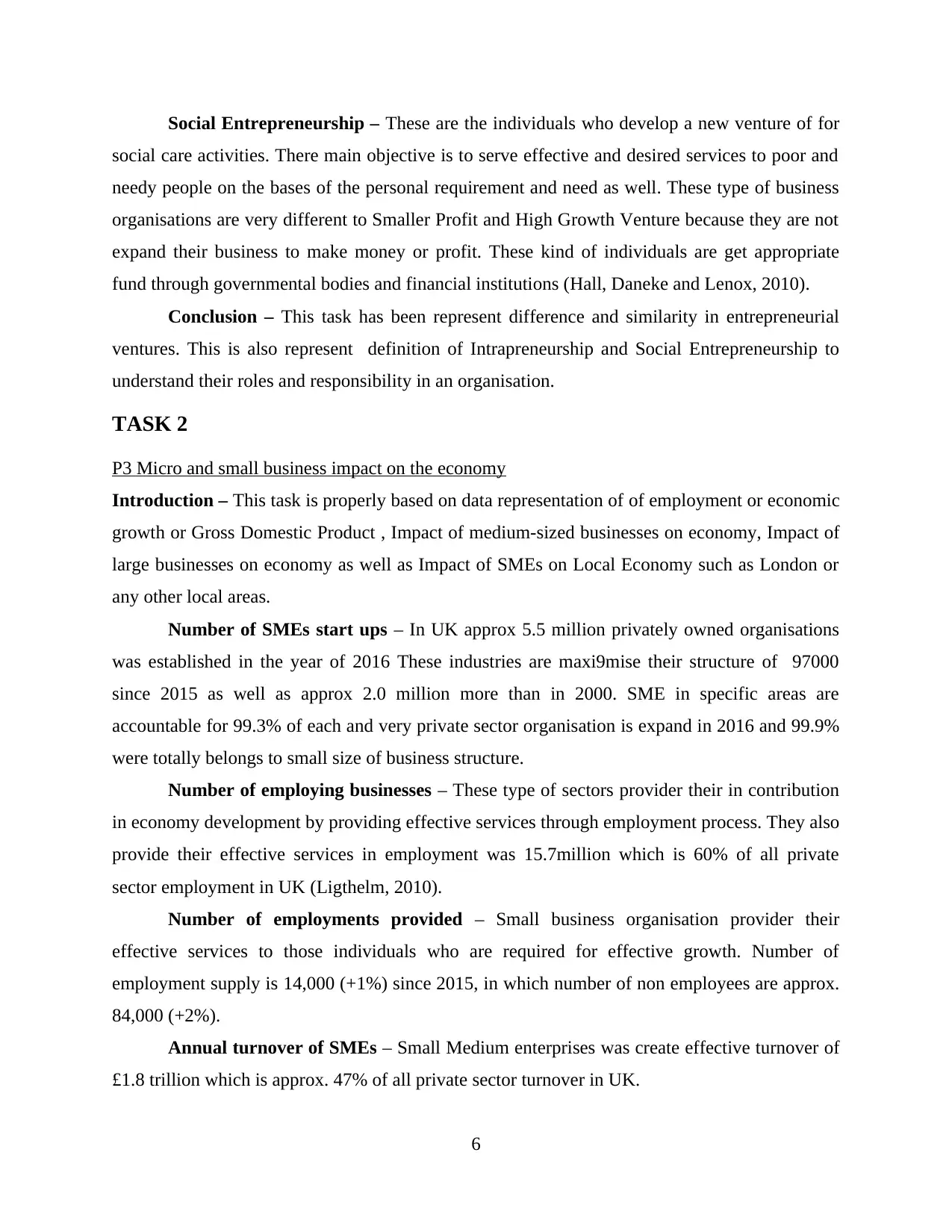
Social Entrepreneurship – These are the individuals who develop a new venture of for
social care activities. There main objective is to serve effective and desired services to poor and
needy people on the bases of the personal requirement and need as well. These type of business
organisations are very different to Smaller Profit and High Growth Venture because they are not
expand their business to make money or profit. These kind of individuals are get appropriate
fund through governmental bodies and financial institutions (Hall, Daneke and Lenox, 2010).
Conclusion – This task has been represent difference and similarity in entrepreneurial
ventures. This is also represent definition of Intrapreneurship and Social Entrepreneurship to
understand their roles and responsibility in an organisation.
TASK 2
P3 Micro and small business impact on the economy
Introduction – This task is properly based on data representation of of employment or economic
growth or Gross Domestic Product , Impact of medium-sized businesses on economy, Impact of
large businesses on economy as well as Impact of SMEs on Local Economy such as London or
any other local areas.
Number of SMEs start ups – In UK approx 5.5 million privately owned organisations
was established in the year of 2016 These industries are maxi9mise their structure of 97000
since 2015 as well as approx 2.0 million more than in 2000. SME in specific areas are
accountable for 99.3% of each and very private sector organisation is expand in 2016 and 99.9%
were totally belongs to small size of business structure.
Number of employing businesses – These type of sectors provider their in contribution
in economy development by providing effective services through employment process. They also
provide their effective services in employment was 15.7million which is 60% of all private
sector employment in UK (Ligthelm, 2010).
Number of employments provided – Small business organisation provider their
effective services to those individuals who are required for effective growth. Number of
employment supply is 14,000 (+1%) since 2015, in which number of non employees are approx.
84,000 (+2%).
Annual turnover of SMEs – Small Medium enterprises was create effective turnover of
£1.8 trillion which is approx. 47% of all private sector turnover in UK.
6
social care activities. There main objective is to serve effective and desired services to poor and
needy people on the bases of the personal requirement and need as well. These type of business
organisations are very different to Smaller Profit and High Growth Venture because they are not
expand their business to make money or profit. These kind of individuals are get appropriate
fund through governmental bodies and financial institutions (Hall, Daneke and Lenox, 2010).
Conclusion – This task has been represent difference and similarity in entrepreneurial
ventures. This is also represent definition of Intrapreneurship and Social Entrepreneurship to
understand their roles and responsibility in an organisation.
TASK 2
P3 Micro and small business impact on the economy
Introduction – This task is properly based on data representation of of employment or economic
growth or Gross Domestic Product , Impact of medium-sized businesses on economy, Impact of
large businesses on economy as well as Impact of SMEs on Local Economy such as London or
any other local areas.
Number of SMEs start ups – In UK approx 5.5 million privately owned organisations
was established in the year of 2016 These industries are maxi9mise their structure of 97000
since 2015 as well as approx 2.0 million more than in 2000. SME in specific areas are
accountable for 99.3% of each and very private sector organisation is expand in 2016 and 99.9%
were totally belongs to small size of business structure.
Number of employing businesses – These type of sectors provider their in contribution
in economy development by providing effective services through employment process. They also
provide their effective services in employment was 15.7million which is 60% of all private
sector employment in UK (Ligthelm, 2010).
Number of employments provided – Small business organisation provider their
effective services to those individuals who are required for effective growth. Number of
employment supply is 14,000 (+1%) since 2015, in which number of non employees are approx.
84,000 (+2%).
Annual turnover of SMEs – Small Medium enterprises was create effective turnover of
£1.8 trillion which is approx. 47% of all private sector turnover in UK.
6

Businesses Employment
thousands
All businesses 5,497,670 26,204 3,860,87
SMEs (0-249 employees) 5,490,470 15,734 1,824,69
8Small businesses (0-49
employees)
5,457,160 12,483 1,278,75
4
With no employees2
4,172,185 4,535 254,5
All employers 1,325,485 21,669 3,606,32
5of which:
1-9 employees 1,081,425 3,978 463,4
2110-49 employees 203,550 3,970 560,7
8850-249 employees 33,310 3,251 545,9
45
250 or more employees 7,200 10,470 2,036,17
2
Impact of SMEs on Local Economy such as London or any other local areas – Small
and medium size business organisation are ballistically established to getting effective growth
and income in target market. Main objective of these organisations is to provide quality services
in Local Economy such as London or any other local areas. Through this they are easily develop
strong relation with target customers.
Impact of medium-sized businesses on economy – These type of business organisation
are develop to getting effective and rapid growth in a economy. Through this economy get
appropriate growth through several tax policies and employment services. All the owners of
these medium sized organisation are create their strong strategy to develop their business
properly in economy. Through this they provide effective growth and development as well.
Impact of large businesses on economy - Large scale business organisations has major
impact on economy development. These type of firms develop several path for international
treading process to getting higher growth and income as well. Large businesses firms provide
their effective services for tax policy and further development services (Nga and
Shamuganathan, 2010).
Conclusion – This above task has been determine Number of SMEs start ups, Number of
employing businesses, Number of employments provided, Annual turnover of SMEs, Number of
registered SMEs for VAT and PAYE. At last it has represent Impact of SMEs on Local
Economy such as London or any other local areas, Impact of medium-sized businesses on
economy and Impact of large businesses on economy.
7
thousands
All businesses 5,497,670 26,204 3,860,87
SMEs (0-249 employees) 5,490,470 15,734 1,824,69
8Small businesses (0-49
employees)
5,457,160 12,483 1,278,75
4
With no employees2
4,172,185 4,535 254,5
All employers 1,325,485 21,669 3,606,32
5of which:
1-9 employees 1,081,425 3,978 463,4
2110-49 employees 203,550 3,970 560,7
8850-249 employees 33,310 3,251 545,9
45
250 or more employees 7,200 10,470 2,036,17
2
Impact of SMEs on Local Economy such as London or any other local areas – Small
and medium size business organisation are ballistically established to getting effective growth
and income in target market. Main objective of these organisations is to provide quality services
in Local Economy such as London or any other local areas. Through this they are easily develop
strong relation with target customers.
Impact of medium-sized businesses on economy – These type of business organisation
are develop to getting effective and rapid growth in a economy. Through this economy get
appropriate growth through several tax policies and employment services. All the owners of
these medium sized organisation are create their strong strategy to develop their business
properly in economy. Through this they provide effective growth and development as well.
Impact of large businesses on economy - Large scale business organisations has major
impact on economy development. These type of firms develop several path for international
treading process to getting higher growth and income as well. Large businesses firms provide
their effective services for tax policy and further development services (Nga and
Shamuganathan, 2010).
Conclusion – This above task has been determine Number of SMEs start ups, Number of
employing businesses, Number of employments provided, Annual turnover of SMEs, Number of
registered SMEs for VAT and PAYE. At last it has represent Impact of SMEs on Local
Economy such as London or any other local areas, Impact of medium-sized businesses on
economy and Impact of large businesses on economy.
7
⊘ This is a preview!⊘
Do you want full access?
Subscribe today to unlock all pages.

Trusted by 1+ million students worldwide
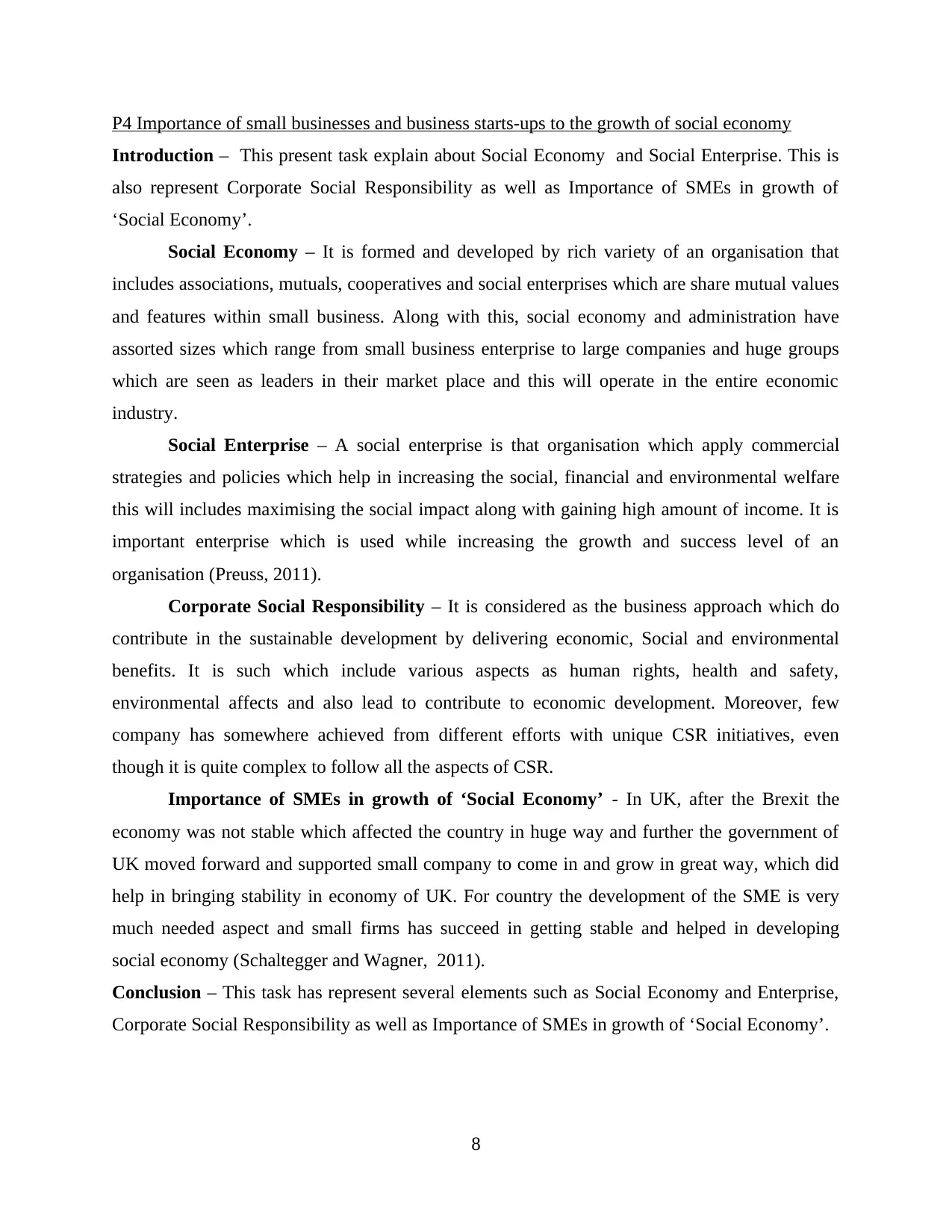
P4 Importance of small businesses and business starts-ups to the growth of social economy
Introduction – This present task explain about Social Economy and Social Enterprise. This is
also represent Corporate Social Responsibility as well as Importance of SMEs in growth of
‘Social Economy’.
Social Economy – It is formed and developed by rich variety of an organisation that
includes associations, mutuals, cooperatives and social enterprises which are share mutual values
and features within small business. Along with this, social economy and administration have
assorted sizes which range from small business enterprise to large companies and huge groups
which are seen as leaders in their market place and this will operate in the entire economic
industry.
Social Enterprise – A social enterprise is that organisation which apply commercial
strategies and policies which help in increasing the social, financial and environmental welfare
this will includes maximising the social impact along with gaining high amount of income. It is
important enterprise which is used while increasing the growth and success level of an
organisation (Preuss, 2011).
Corporate Social Responsibility – It is considered as the business approach which do
contribute in the sustainable development by delivering economic, Social and environmental
benefits. It is such which include various aspects as human rights, health and safety,
environmental affects and also lead to contribute to economic development. Moreover, few
company has somewhere achieved from different efforts with unique CSR initiatives, even
though it is quite complex to follow all the aspects of CSR.
Importance of SMEs in growth of ‘Social Economy’ - In UK, after the Brexit the
economy was not stable which affected the country in huge way and further the government of
UK moved forward and supported small company to come in and grow in great way, which did
help in bringing stability in economy of UK. For country the development of the SME is very
much needed aspect and small firms has succeed in getting stable and helped in developing
social economy (Schaltegger and Wagner, 2011).
Conclusion – This task has represent several elements such as Social Economy and Enterprise,
Corporate Social Responsibility as well as Importance of SMEs in growth of ‘Social Economy’.
8
Introduction – This present task explain about Social Economy and Social Enterprise. This is
also represent Corporate Social Responsibility as well as Importance of SMEs in growth of
‘Social Economy’.
Social Economy – It is formed and developed by rich variety of an organisation that
includes associations, mutuals, cooperatives and social enterprises which are share mutual values
and features within small business. Along with this, social economy and administration have
assorted sizes which range from small business enterprise to large companies and huge groups
which are seen as leaders in their market place and this will operate in the entire economic
industry.
Social Enterprise – A social enterprise is that organisation which apply commercial
strategies and policies which help in increasing the social, financial and environmental welfare
this will includes maximising the social impact along with gaining high amount of income. It is
important enterprise which is used while increasing the growth and success level of an
organisation (Preuss, 2011).
Corporate Social Responsibility – It is considered as the business approach which do
contribute in the sustainable development by delivering economic, Social and environmental
benefits. It is such which include various aspects as human rights, health and safety,
environmental affects and also lead to contribute to economic development. Moreover, few
company has somewhere achieved from different efforts with unique CSR initiatives, even
though it is quite complex to follow all the aspects of CSR.
Importance of SMEs in growth of ‘Social Economy’ - In UK, after the Brexit the
economy was not stable which affected the country in huge way and further the government of
UK moved forward and supported small company to come in and grow in great way, which did
help in bringing stability in economy of UK. For country the development of the SME is very
much needed aspect and small firms has succeed in getting stable and helped in developing
social economy (Schaltegger and Wagner, 2011).
Conclusion – This task has represent several elements such as Social Economy and Enterprise,
Corporate Social Responsibility as well as Importance of SMEs in growth of ‘Social Economy’.
8
Paraphrase This Document
Need a fresh take? Get an instant paraphrase of this document with our AI Paraphraser
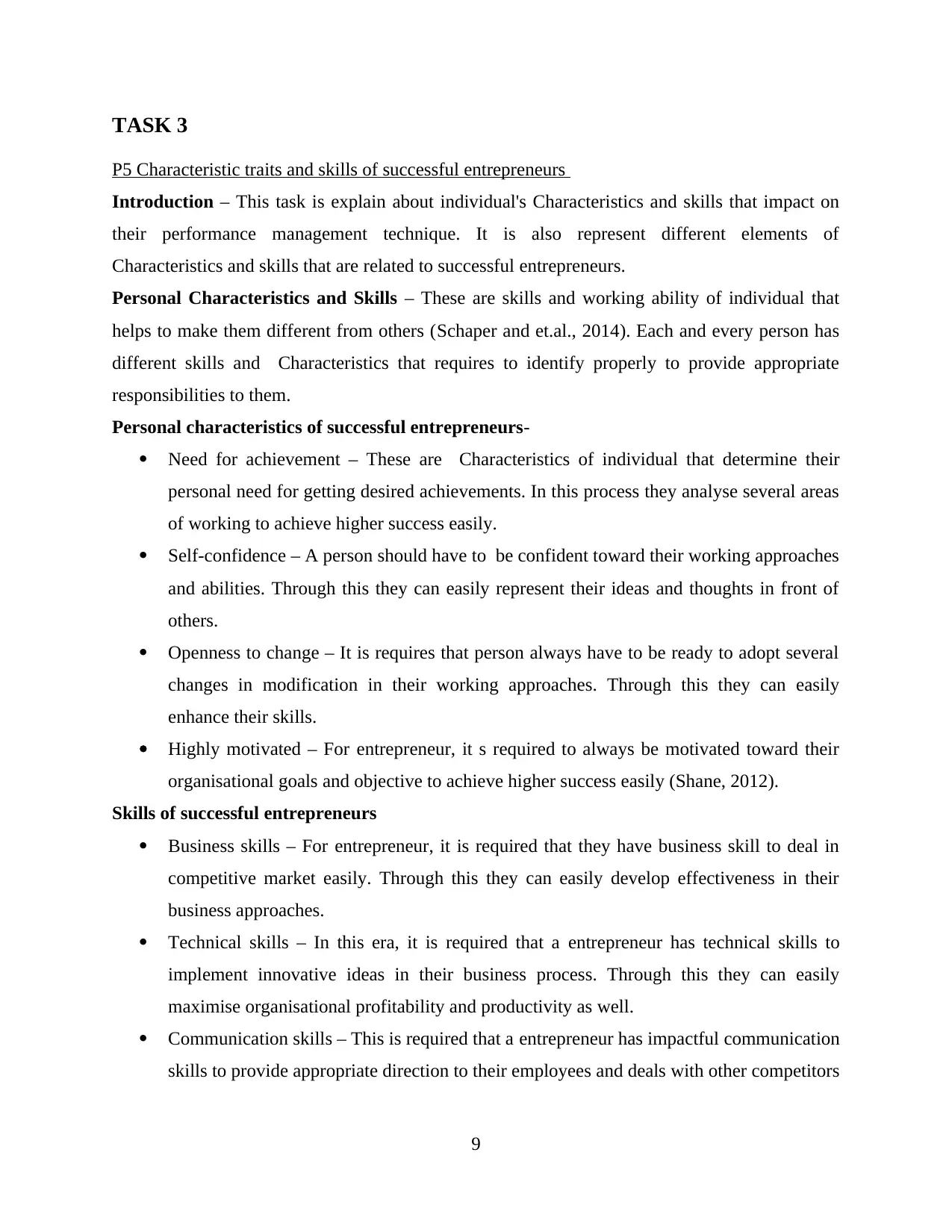
TASK 3
P5 Characteristic traits and skills of successful entrepreneurs
Introduction – This task is explain about individual's Characteristics and skills that impact on
their performance management technique. It is also represent different elements of
Characteristics and skills that are related to successful entrepreneurs.
Personal Characteristics and Skills – These are skills and working ability of individual that
helps to make them different from others (Schaper and et.al., 2014). Each and every person has
different skills and Characteristics that requires to identify properly to provide appropriate
responsibilities to them.
Personal characteristics of successful entrepreneurs-
Need for achievement – These are Characteristics of individual that determine their
personal need for getting desired achievements. In this process they analyse several areas
of working to achieve higher success easily.
Self-confidence – A person should have to be confident toward their working approaches
and abilities. Through this they can easily represent their ideas and thoughts in front of
others.
Openness to change – It is requires that person always have to be ready to adopt several
changes in modification in their working approaches. Through this they can easily
enhance their skills.
Highly motivated – For entrepreneur, it s required to always be motivated toward their
organisational goals and objective to achieve higher success easily (Shane, 2012).
Skills of successful entrepreneurs
Business skills – For entrepreneur, it is required that they have business skill to deal in
competitive market easily. Through this they can easily develop effectiveness in their
business approaches.
Technical skills – In this era, it is required that a entrepreneur has technical skills to
implement innovative ideas in their business process. Through this they can easily
maximise organisational profitability and productivity as well.
Communication skills – This is required that a entrepreneur has impactful communication
skills to provide appropriate direction to their employees and deals with other competitors
9
P5 Characteristic traits and skills of successful entrepreneurs
Introduction – This task is explain about individual's Characteristics and skills that impact on
their performance management technique. It is also represent different elements of
Characteristics and skills that are related to successful entrepreneurs.
Personal Characteristics and Skills – These are skills and working ability of individual that
helps to make them different from others (Schaper and et.al., 2014). Each and every person has
different skills and Characteristics that requires to identify properly to provide appropriate
responsibilities to them.
Personal characteristics of successful entrepreneurs-
Need for achievement – These are Characteristics of individual that determine their
personal need for getting desired achievements. In this process they analyse several areas
of working to achieve higher success easily.
Self-confidence – A person should have to be confident toward their working approaches
and abilities. Through this they can easily represent their ideas and thoughts in front of
others.
Openness to change – It is requires that person always have to be ready to adopt several
changes in modification in their working approaches. Through this they can easily
enhance their skills.
Highly motivated – For entrepreneur, it s required to always be motivated toward their
organisational goals and objective to achieve higher success easily (Shane, 2012).
Skills of successful entrepreneurs
Business skills – For entrepreneur, it is required that they have business skill to deal in
competitive market easily. Through this they can easily develop effectiveness in their
business approaches.
Technical skills – In this era, it is required that a entrepreneur has technical skills to
implement innovative ideas in their business process. Through this they can easily
maximise organisational profitability and productivity as well.
Communication skills – This is required that a entrepreneur has impactful communication
skills to provide appropriate direction to their employees and deals with other competitors
9
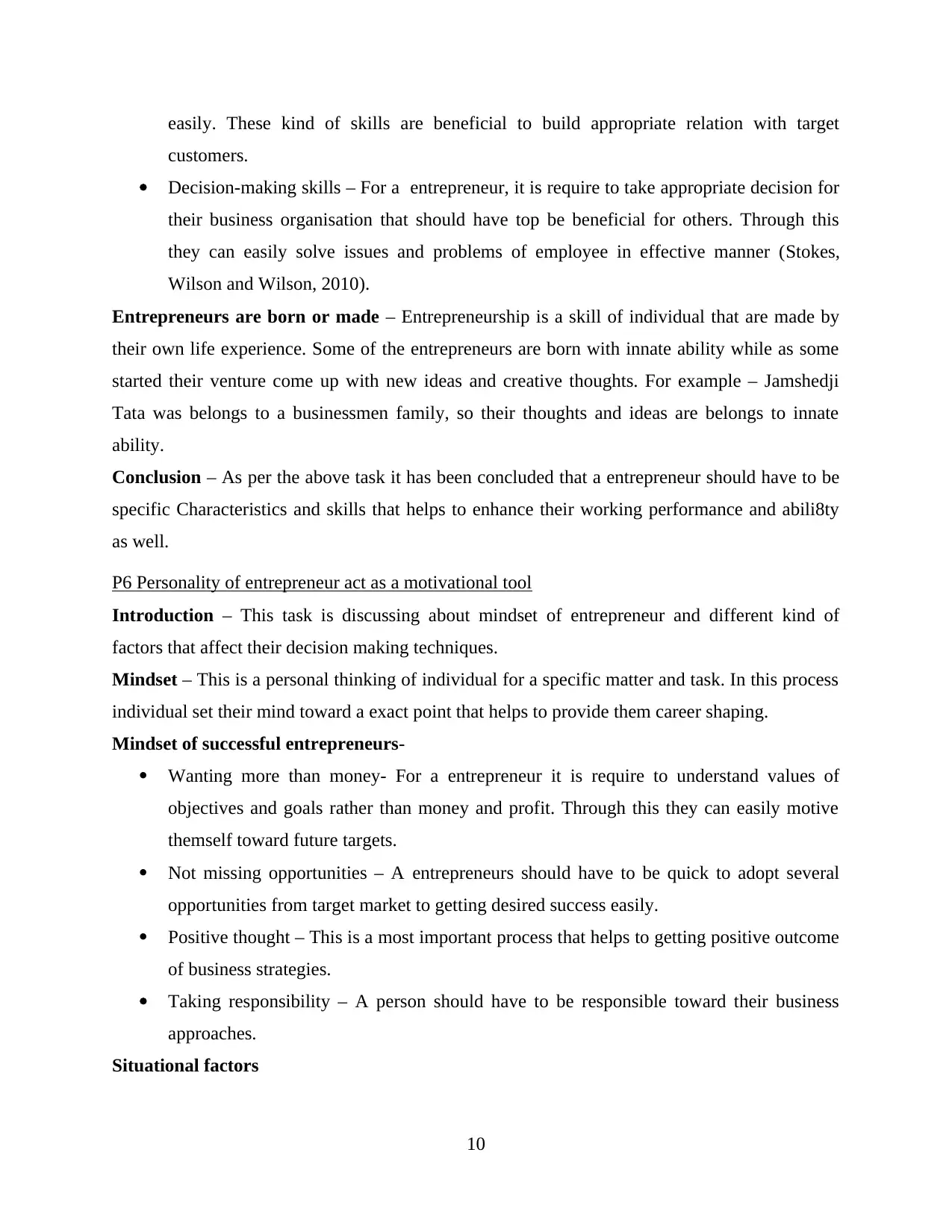
easily. These kind of skills are beneficial to build appropriate relation with target
customers.
Decision-making skills – For a entrepreneur, it is require to take appropriate decision for
their business organisation that should have top be beneficial for others. Through this
they can easily solve issues and problems of employee in effective manner (Stokes,
Wilson and Wilson, 2010).
Entrepreneurs are born or made – Entrepreneurship is a skill of individual that are made by
their own life experience. Some of the entrepreneurs are born with innate ability while as some
started their venture come up with new ideas and creative thoughts. For example – Jamshedji
Tata was belongs to a businessmen family, so their thoughts and ideas are belongs to innate
ability.
Conclusion – As per the above task it has been concluded that a entrepreneur should have to be
specific Characteristics and skills that helps to enhance their working performance and abili8ty
as well.
P6 Personality of entrepreneur act as a motivational tool
Introduction – This task is discussing about mindset of entrepreneur and different kind of
factors that affect their decision making techniques.
Mindset – This is a personal thinking of individual for a specific matter and task. In this process
individual set their mind toward a exact point that helps to provide them career shaping.
Mindset of successful entrepreneurs-
Wanting more than money- For a entrepreneur it is require to understand values of
objectives and goals rather than money and profit. Through this they can easily motive
themself toward future targets.
Not missing opportunities – A entrepreneurs should have to be quick to adopt several
opportunities from target market to getting desired success easily.
Positive thought – This is a most important process that helps to getting positive outcome
of business strategies.
Taking responsibility – A person should have to be responsible toward their business
approaches.
Situational factors
10
customers.
Decision-making skills – For a entrepreneur, it is require to take appropriate decision for
their business organisation that should have top be beneficial for others. Through this
they can easily solve issues and problems of employee in effective manner (Stokes,
Wilson and Wilson, 2010).
Entrepreneurs are born or made – Entrepreneurship is a skill of individual that are made by
their own life experience. Some of the entrepreneurs are born with innate ability while as some
started their venture come up with new ideas and creative thoughts. For example – Jamshedji
Tata was belongs to a businessmen family, so their thoughts and ideas are belongs to innate
ability.
Conclusion – As per the above task it has been concluded that a entrepreneur should have to be
specific Characteristics and skills that helps to enhance their working performance and abili8ty
as well.
P6 Personality of entrepreneur act as a motivational tool
Introduction – This task is discussing about mindset of entrepreneur and different kind of
factors that affect their decision making techniques.
Mindset – This is a personal thinking of individual for a specific matter and task. In this process
individual set their mind toward a exact point that helps to provide them career shaping.
Mindset of successful entrepreneurs-
Wanting more than money- For a entrepreneur it is require to understand values of
objectives and goals rather than money and profit. Through this they can easily motive
themself toward future targets.
Not missing opportunities – A entrepreneurs should have to be quick to adopt several
opportunities from target market to getting desired success easily.
Positive thought – This is a most important process that helps to getting positive outcome
of business strategies.
Taking responsibility – A person should have to be responsible toward their business
approaches.
Situational factors
10
⊘ This is a preview!⊘
Do you want full access?
Subscribe today to unlock all pages.

Trusted by 1+ million students worldwide
1 out of 16
Related Documents
Your All-in-One AI-Powered Toolkit for Academic Success.
+13062052269
info@desklib.com
Available 24*7 on WhatsApp / Email
![[object Object]](/_next/static/media/star-bottom.7253800d.svg)
Unlock your academic potential
Copyright © 2020–2026 A2Z Services. All Rights Reserved. Developed and managed by ZUCOL.




